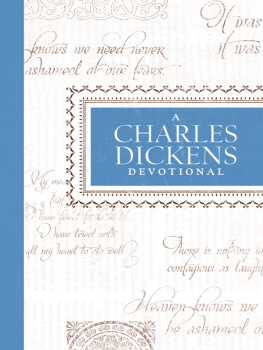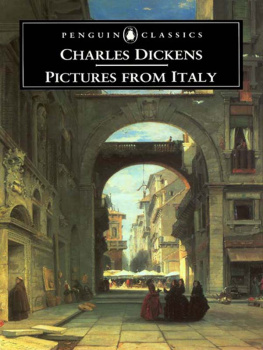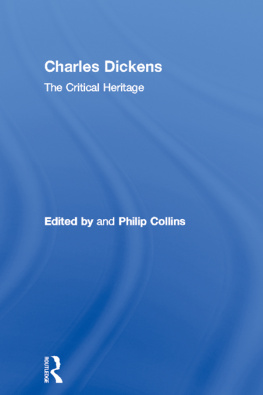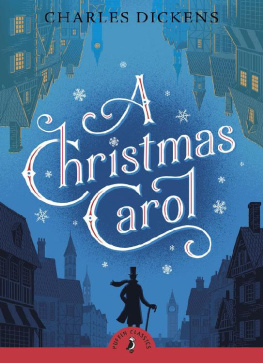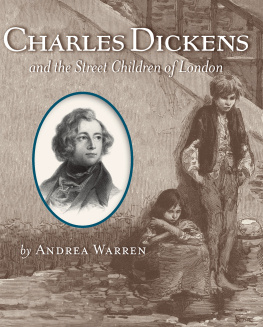DRINKING WITH DICKENS
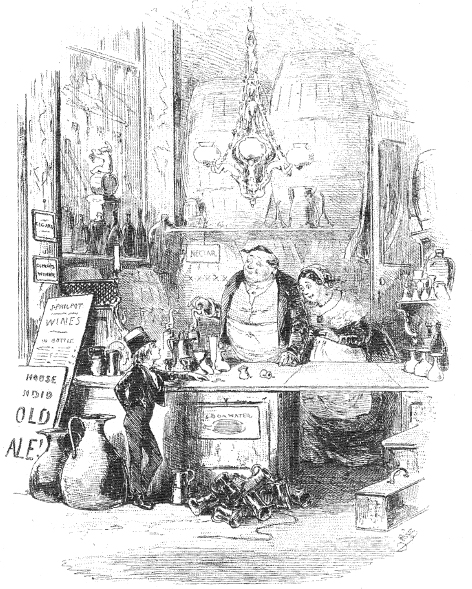
My magnificent order at the public-house
DRINKING
WITH
DICKENS
being a light-hearted sketch
by
CEDRIC DICKENS
great-grandson of Charles Dickens
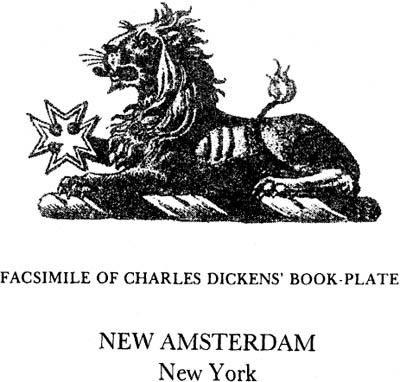
First published 1980 by Cedric Dickens
Cedric Dickens
All rights reserved.
This edition published in the United States of America, 1988, by New Amsterdam Books of New York, Inc., by arrangement with Elvendon Press, Goring-on-Thames.
ISBN: 978-0-941533-34-8
NEW AMSTERDAM BOOKS
171 Madison Avenue
New York, NY 10016
Designed by Franois de Mauny MSIAD
Printed and bound in Great Britain
Contents
To
John Greaves
late Hon. Secretary to
the Dickens Fellowship
Will you permit me to have the pleasure, sir?
It would be impossible to express my appreciation to all those who have helped me with this book.
Let me say a simple thank you to all my friends all over the world, especially to the Dickens Fellowship branches in Adelaide, Bath, Boulogne, Broadstairs, Haarlem and Philadelphia: to David Parker, curator of the Dickens House Museum at 48 Doughty Street, London, and the helpful and amiable staff there: to Alan Watts, Hon. Secretary of the Dickens Fellowship a budding Mr Pickwick, swellin wisibly for putting me right in so many ways: to my brother, Harry, and his gorgeous and gifted staff, for their ideas and help in the preparation of the manuscript: to Messrs Hodder & Stoughton for permission to use Frank Reynolds sublime Mr Micawber and Young David who grace the back cover: to the Henry W and Albert A Berg Collection, The New York Public Library, Astor, Lenox and Tilden Foundations and the Pilgrim Edition of the Letters of Charles Dickens for permission to copy the letter to John Noble on : to Michael Saunders-Watson of Rockingham Castle for allowing me to copy the original recipe, Moonbeams: to Ainsley Johnson for dotting my Ps and Qs so relentlessly; but mostly to Elizabeth, my darling wife, for her encouragement, and especially for drinking unflinchingly the many potent potions included in this book, for making me discard the more vicious, for doing most of my share of the gardening and making my life so very happy.
What does my noble captain drink is it brandy, rum, usquebaugh? Is it soaked gunpowder, or blazing oil? Give it a name, heart of oak, and wed get it for you, if it was wine from a bishops cellar, or melted gold from King Georges mint.
God bless you, everyone.
Cedric Dickens
Somerset
Friday 13 June 1980
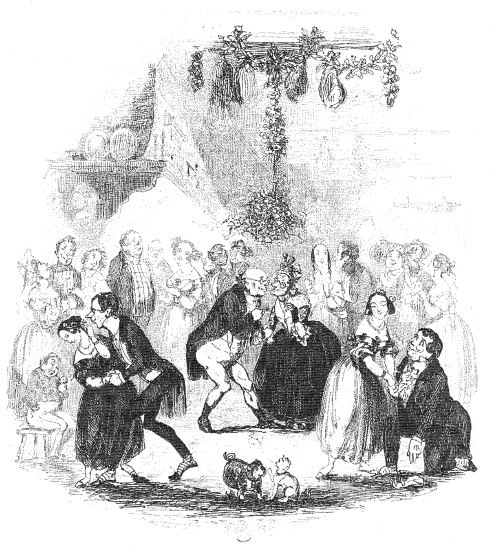
Christmas Eve at Mr Wardles
Introduction
Maurice McCullum, young, enthusiastic, professor of English Literature at the College of the Pacific, Stockton, California, stayed with us in January. Snow was on the ground and it was conducive to spending the time browsing over Dickensian recipes and, perchance, to taste here and there.
The more he tasted the more enthusiastic he became. It was, I think, over a steaming bowl of Bishop that he hammered the table and made me promise to record some of the recipes handed down to me or collected from my friends all over the world. Next morning it still seemed a good idea the more so when I realized that nobody seems to have milked the fertile pages of my great-grandfathers works and letters to gather some of the glorious drinks found there.
Yes, Charles Dickens was my great-grandfather, and how lucky I am! Even today, more than a hundred years after his death, the magic of his name opens all kinds of unsuspecting doors not only in London or England, but all over the world.
People love talking about him, possibly because he was the champion of the ordinary man, and because he wrote rattling good stories about characters who live today, characters ripe for television. Take for instance A Christmas Carol, which so often appears at Christmastide and surely helps to give that extra happiness so necessary at that time of the year: I will honour Christmas in my heart, and try to keep it all the year. The family round the fireside the shadowy light of candles and flickering firelight, the warmth and intimacy of the family circle, and the punch bowl on the hearth. Yes, even poor Bob Cratchit, earning a pittance, compounded his punch at Christmas. The Bob Cratchits, and indeed all the characters of Dickens world, live on in our imagination and in fact still exist.
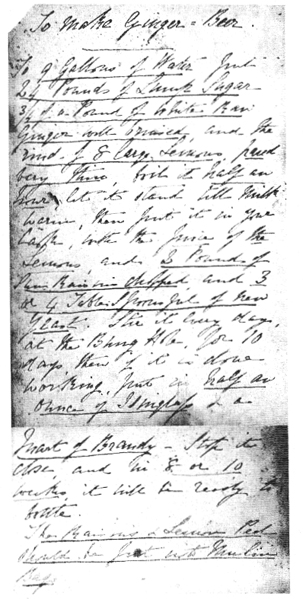
Auntie Georgies Recipe for Ginger Beer
Once I was being driven in London by a taxi driver who was the double of Tony Weller, the great coachman in Pickwick Papers, and the father of Sam. It was Tony Weller who gave Mr Pickwick the cure for gout: Jist you marry a widder as has got a good loud woice, with a decent notion of usin it, and youll never have the gout again.
We began talking and I pointed out The Six Jolly Fellowship Porters, the public-house bulging out with a dropsical air over the river Thames. In the days of my great-grandfather the door posts bore an inscription proclaiming it The Early Purl House. That very friendly Dickensian taxi driver introduced me to my first taste of Purl.
In New Orleans I was taken by a benevolent Mr Wardle to the Pickwick Club. This was the first of a long line of Pickwick Clubs all over the world; it was founded in Charles Dickens lifetime. There I was given a Mint Julep. A Mr Simmery in New York mixed a Dry Martini for me; this was sweet in comparison with the one a Captain Swosser gave me recently in Philadelphia.
Charles Dickens, his characters, the Christmas of Dickens, and the ever present punch bowl are all symbolised for me by a little book lying on my desk as I now write. Dated 1859, it is a penny note book of drink recipes kept by Auntie Georgie Georgina Hogarth when she was looking after the younger children at Gads Hill, Charles Dickens last home. It starts with a recipe for Ginger Beer, a teetotal drink, which calls for a quart of brandy!
Then there is the catalogue of the Gads Hill sale after Charles Dickens died, which shows the contents of the cellar at that time. It would be large by todays standards, but must have been conservative then. (See ).
There are also recipes which have been handed down through the mists of time in the case of Milk Punch, from Mr Robert Sawyer, late Nockemorf, himself. One practically lethal potion comes from a very old Australian friend, Edmund Gosse, who when travelling to England concocted it with the purser of the ship. To be fair to him, he was very much younger in those days.
Many of the drinks are medicinal and of course this is right: alcohol judiciously taken is the staff of life. Moderation is the key to happiness in so many things. My grandfather, Sir Henry Dickens, affectionately known as Pupsey, remembers his father as being abstemious in his habits, although there was much in his books concerning good cheer and plentiful libations especially in Pickwick Papers which he started when just twenty-four years old.
Pupsey too was abstemious in his habits. He ended a successful career at the Bar as Common Serjeant, the City of Londons own judge, and had to go to many a City dinner. He used to drink a bottle of champagne whilst dressing for dinner, and considered my parents decadent because they shared a bottle. I dont remember if he suffered in the morning, although he did on occasions complain of crinkly toes in bed. Many years later I discovered what he meant by crinkly toes and even remembered the prevention and cure. He was indeed a great man and I only wish I had been old enough, and interested enough, to pump him about his famous father. He must have known him well, being twenty-one at the time of his death.


